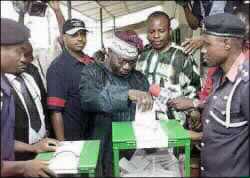ABUJA (AFP) - President Olusegun Obasanjo's ruling party was heading for victory in Nigerian parliamentary elections, just four days before a presidential poll that will test his country's democracy.
With more than two-thirds of constituencies declared, Obasanjo's People's Democratic Party (PDP) had more than 50 percent of the vote and 135 of the 234 seats in Nigeria's lower house declared Tuesday.
Saturday's vote was Nigeria's first since the end of military rule in 1999 and Africa's biggest ever, with more than 60 million registered voters spread across the continent's most populous country.
Campaigning ahead of polling day was a bloody affair and there were fears that widespread violence or ballot-rigging could again mar Nigeria's attempts to consolidate civilian rule, as it had previous polls.
In the end, by Nigerian standards, the level of violence was quite low, and outside of the troubled southeast, polling was largely conducted in an orderly way, with voters gleefully ousting incumbents in many areas.
"It was a question of the credibility of the image of Africa as a whole and in all it was fairly good," said Abdoulaye Bathily, vice-president of Senegal's National Assembly and head of a team of African Union monitors.
But question marks still hang over the standards of organisation of the poll, which began late in many areas, had no provision for voting in secret and in which vote counting was often conducted under opaque circumstances.
"We were very pleased at the low level of violence. The question of how free and fair it was is a whole other set of criteria that has yet to be shown," a US State Department official said in Washington.
The International Republican Institute (IRI), a US pro-democracy group, said it had witnessed "serious lapses at critical levels of the election administrative structure".
And independent Nigerian monitors reported at least a dozen deaths, mainly in the southeast, gun-battles between factions, theft of ballot boxes, burnt down polling stations and attacks on party supporters.
Nigeria's electoral agency has admitted to many of these problems and is to conduct new polls in districts of three states where fraud was rampant.
Observers said the problems should be sorted out by Saturday's all important vote when Nigerians will be invited to choose a president and 36 state governors.
Obasanjo himself congratulated Nigerian voters on the parliamentary election, but his analysis was less positive than some of the foreign observer groups.
He said the poll was "substantially devoid of massive rigging" and welcomed "the drastic reduction in incidences of violence".
"I will urge all Nigerians to continue in this spirit for the rest of the elections," he said, in a televised address Monday.
Obasanjo must win 51 percent of the vote nationwide and at least a quarter of votes cast in two-thirds of Nigeria's 36 states in Saturday's poll to avoid going to a second round one week later.
His main challenger, Muhammadu Buhari of the All Nigeria People's Party, has seen his supporters make dramatic gains at the PDP's expense in northern Nigeria, but they trail at around 27 percent nationally.
The last time that Nigeria attempted to pass power from one elected civilian government to another, in 1983, the new regime lasted just three months before Buhari, then a general, overthrew it in a military coup.
Most Nigerian analysts now expect that any problems that might arise in the election will come in the governorship races, where some unscrupulous leaders may use violence or fraud to try to cling to power.
The parliamentary results have so far surprised commentators with the number of seats swinging from one party to another, and many governors are now nervous about their ability to retain their lucrative posts.
PHOTO CAPTION
Nigerian President Olusegun Obasanjo casts his vote in the first civilian-run parliamentary poll in 20 years. Obasanjo and his party have collected over 50% of the vote.(AFP/File/Pius Uktomi Ekpei)
- Author:
AFP - Section:
WORLD HEADLINES


 Home
Home Discover Islam
Discover Islam Quran Recitations
Quran Recitations Lectures
Lectures
 Fatwa
Fatwa Articles
Articles Fiqh
Fiqh E-Books
E-Books Boys & Girls
Boys & Girls  Women
Women










